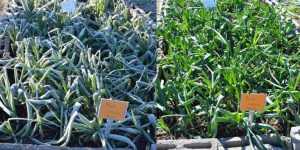
By Les Harrison
Wakulla County Extension Director
The arrival earlier this week of frigid winter weather in Wakulla County by way of 2017’s first polar express has changed the gardening landscape. Only the hardiest vegetables have survived, and most of these are leaf crops.
One resilient vegetable which is not strictly a leaf crop planted in the autumn for winter harvest is the onion. If raised for the bulb, the onion is approximately a 180 day crop which is harvested in the late spring.
Onions are a common cool season root vegetable which grows well in local sandy soils. This native of central Asia handles north Florida’s winters with scarcely a challenge to its hardy heritage.
Anthropologist and archeologist estimate the onion has been cultivated for between 5,000 to 7,000 years. Its residue has been documented at bronze-age settlements.
The easy portability and long shelf-life have made onions a staple across the annals of many cultures throughout history. Their long ago uses extended far beyond being a mere culinary option.
The ancient Egyptians believed onions were a divinely inspired artifact symbolizing eternal life. Pharaohs’ tombs were supplied with a stock for the afterlife. Athletes in Greece and Rome used onions as a means of improving their competiveness.
Medicinal attributes have long been attributed to onions. Baldness cures, headache relief, snakebite remedies and much more have included onions as part of the concoction.
While it is true that 21st century onions are found in the garden and pantry not the pharmacy, there is research evidence indicating some of the compounds they contain have a very positive effect on humans.
Onions are used in a variety of contemporary dishes. The bulb and the greens are used, and may be served cooked or uncooked.
Green onions have a short life for peak quality. They need to be refrigerated in a plastic bag for use as soon as possible.
Bulb onions can be stored at room temperature in legs of clean, sheer pantyhose or laid out on a counter with space between for adequate air circulation. If stored in the hose, tie a knot between each and cut above the knot when ready to use.
Onions can be preserved in a number of ways. Bulb onion can be frozen either whole or chopped, but they will not be crisp when defrosted. Onion rings can be prepared and frozen quickly on a tray before packaging.
Onions with a 1-inch diameter or less can be canned. They are considered a low-acid vegetable, so preserving under pressure is necessary. Onions are also considered very suitable for dehydrating.
There are currently two onion varieties in the UF/IFAS Wakulla County Extension demonstration garden. The frost and temperatures in the mid 20’s wilted the onions in the garden, but by noon they had nearly return to their pre-frost vigor.
There is a white and a red open pollinator variety currently planted, both available locally during the autumn for early season planting.
Anyone interested in learning about growing onions or other garden crops can sign up for the 2017 Master Gardener class. The 15 week course will begin on January 19, 2017 and is open to anyone interested in learning more about horticulture in Wakulla County.
To learn more about growing and using onions in Wakulla County or to sign up for the Master Gardener program, contact your UF/IFAS Wakulla Extension Office at 850-926-3931 or https://blogs.ifas.ufl.edu/wakullaco/
 0
0
